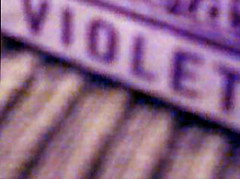This evening I totally gave up on my endeavors to read Tango and the Political Economy of Passion (which is a highly intelligent and interesting book - I just wasn't patient enough to put up with its style this weekend) and went with my roommate to see Bride and Prejudice as a guilty treat right before my long day of classes tomorrow. The film is directed by the woman who directed Bend it Like Beckham and it's a combination of Bollywood style and the plot of Jane Austen's Pride and Prejudice. It was released several months ago and I never went to see it, and it will probably be out on DVD pretty soon; I was honestly suprised that it was still playing at one of the smaller theaters near my house. The film got mostly horrible reviews, and honestly it would be hard for me to say who its ideal audience was, but personally I loved it.
I thought the film was fun and funny and self-aware and above all, beautiful. The actors and actresses were beautiful, the color and design was beautiful, the dance numbers were riveting. The film was not for a moment subtle by any stretch of the imagination, but it was grand and excessive and adorable and I spent a good deal of time giggling out loud, for both the moments that were delightful and those that made me cringe.
The not-so-hidden concern behind the film was globalization and the commodification of Indian culture: "you want five-star comfort with a little bit of culture" and the film was honestly participating in the exoticism while grappling with it. In the film, the solution seemed to be Darcy passing on buying an Indian hotel and learning some traditional drumming to impress his bride. The issue seemed a little unresolved and less than satisfying, but I think knowing that it's a problem without knowing the answer is probably about the best you can get and that's OK with me.
The film was much less concerned with the heteronormativity and conservativeness of its approach to marriage. Everyone seems to learn in the end that parents will always try to arrange marriages, and that perhaps some people can be happy with mercenary arrangements, but that marriage for love is truly ideal. The film ridicules mothers who attempt to organize marriage as a commodification of their daughters, selling them to the wealthiest suitor, but it is still the rich who prosper in the end. And it is also India who is represented by the traditional family and the women while the men are all wealthy and if not all Western then at least all living in LA or London. These men penetrate India, coming to a small town to meet and take away her daughters. I would have liked to see a resolution in which Lalita forces Darcy to stay in India with her beyond the traditional Indian wedding ceremony and riding off into the sunset on an elephant (really!).
As a version of Pride and Prejudice the film did leave a bit to be desired. Half the fun of that novel (or six-hour miniseries version with Colin Firth) is its deliberate pacing and maddening tension. The fast-paced Bollywood style creates a rather inconsistent mix. Lalita in Bride and Prejudice was a little too idealized as a heroine; though she jumped down Darcy's throat about economic colonialism and his Western ignorance, there wasn't really a moment where she wasn't completely lovable and we didn't totally sympathize with her as an audience. Darcy just didn't command as much attention or sympathy. But I think looking at the film in relationship to Pride and Prejudice is probably not the best way to judge it. As a work of weaving images and cultures, the film is brilliant and stunning, and its adherence to Austen's original is only equally as relevant as its adherence to the standards of Bollywood film, which I am the first to admit I am in no position to judge, although it did make me want to know more and in that if in nothing else I feel it was a success.
Watching the film made me even more anxious to read Gayatri Gopinath's book, Impossible Desires: Queer Diasporas and South Asian Public Cultures, which I haven't bought yet despite how excited I was for it to come out. From what I've seen of her speaking, Gopinath is brilliant, and I'd love to read more about her queer feminist postcolonial approach to Bollywood and "South Asian diasporic feminist filmmakers". When I saw her speak, she talked a bit about how the isolation between men and women in many Bollywood films creates a strong homosocial environment which can lead to homoerotic moments. I'd love to read more. And learn more about Bollywood and diasporic South Asian film, a category to which Bride and Prejudice certainly belongs.
Overall, I thought the film was delightful and I totally recommend it, but I also advise focusing on the pleasure of it rather than the politics. I suspect that is what it wants.
Zin Galactic cut
-
Zin Galactic cut
Sometimes there's something I like but I have to cut it because of how the
play functions better without it. I just cut this from Zin Gal...
3 days ago

0 comments:
Post a Comment